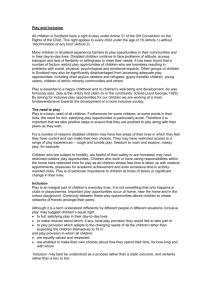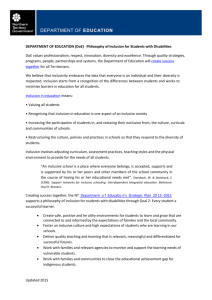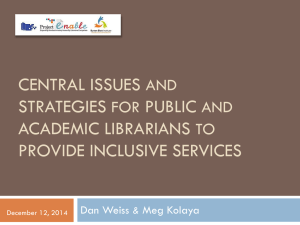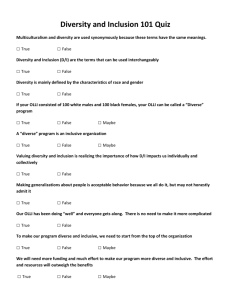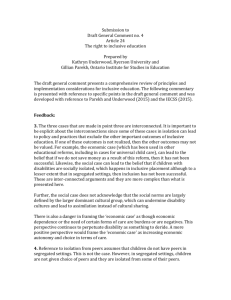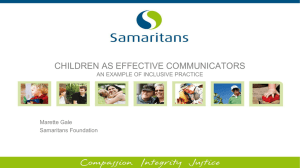Read a summary of this research (DOC 75 KB)
advertisement
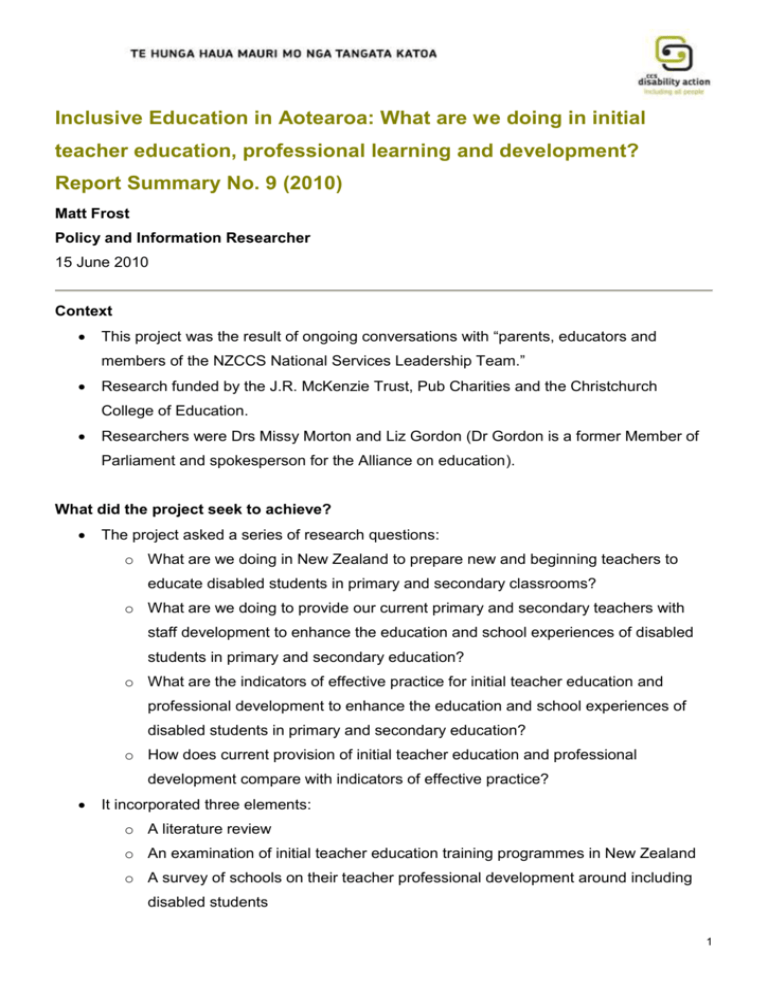
Inclusive Education in Aotearoa: What are we doing in initial teacher education, professional learning and development? Report Summary No. 9 (2010) Matt Frost Policy and Information Researcher 15 June 2010 Context This project was the result of ongoing conversations with “parents, educators and members of the NZCCS National Services Leadership Team.” Research funded by the J.R. McKenzie Trust, Pub Charities and the Christchurch College of Education. Researchers were Drs Missy Morton and Liz Gordon (Dr Gordon is a former Member of Parliament and spokesperson for the Alliance on education). What did the project seek to achieve? The project asked a series of research questions: o What are we doing in New Zealand to prepare new and beginning teachers to educate disabled students in primary and secondary classrooms? o What are we doing to provide our current primary and secondary teachers with staff development to enhance the education and school experiences of disabled students in primary and secondary education? o What are the indicators of effective practice for initial teacher education and professional development to enhance the education and school experiences of disabled students in primary and secondary education? o How does current provision of initial teacher education and professional development compare with indicators of effective practice? It incorporated three elements: o A literature review o An examination of initial teacher education training programmes in New Zealand o A survey of schools on their teacher professional development around including disabled students 1 It is recognised that an effective initial teacher education programme is required for inclusive education to work well. Other research confirms this and notes, “the world class schools that our society needs and expects require a well-prepared and qualified diverse, professional teaching cohort…There is a growing consensus that the single most important influence in the education of a child is a well-prepared, caring and qualified teacher. (p. 3) Inclusion has been given a place of prominence in terms of educational policy in spite of the fact that teachers may not be well prepared to teach in inclusive ways. Power, politics and ethics in education Social justice plays an important part when thinking about inclusive education. It is important for all educators (including those working with disabled children and young people) to engage in reflective teaching practice. They need to examine critically how their own work as a teacher (including their training) is influenced by often quite subtle assumptions about power and labelling of groups of children. Teachers “must have a critical understanding of the structures of society, must value a range of students and be caring of students and able to motivate them.” (p. 4) Teachers need to realise that they can be the agents of change in their schools however, many teacher education programmes do not encourage this critical thinking. Comparisons are made between disability and other forms of diversity such as race and colour. It is noted that “schools tend to be rich in cultural diversity but that special educators need to take a lead in providing diverse cultural environments…Many students from other cultures end up as ‘special education’ students because of the biased expectations of schools.” (pp. 5-6) Professor of Inclusive Education, University of London, Roger Slee, asks the question “should not the preparation of ‘inclusive’ teachers be woven right across the fabric of the teacher training curriculum?” (p. 6) He argues against a league table approach and making units of ‘special education’ compulsory in the general teacher education curriculum. There are differences of opinion amongst teachers as to exactly what inclusion means – from all students learning together in general classrooms to ‘educating students with learning disabilities or students who are functioning at close to grade level in general education classrooms.” (p. 7) The New Zealand context 2 The report acknowledges that the New Zealand education system has many elements that should support inclusive practice, including: o An inclusionary legislative framework o A general system of teacher education (every teacher is exposed to some core training in their degree) o A school framework and curriculum that specifically mentions the importance of diversity There are several elements of the New Zealand education system that make inclusion more difficult to achieve. These include the policy issue of ‘school choice’ that tends to favour students and their families if these children are academically inclined. The researchers undertook an examination and content analysis of both policy documents related to education and the content of teacher training programmes. They also examined post training professional development in schools. Just what does ‘inclusion’ mean? One of the biggest barriers to effective teaching of inclusive education is the wide divergence in just what ‘inclusion’ of disabled learners in an education sense means. The researchers found a “sector rife with differing definitions and meanings, disparate policies and practices, highly uneven descriptions of what inclusion means in teacher education, courses that uphold the theory of inclusion but not its practice and resistance at the school level” (p. 10) The New Zealand Disability Strategy is mentioned as a document that should be having an impact on the teaching of inclusive education but is not. “Not a single interviewee mentioned the Disability Strategy as a key tool for promoting the rights of people with disabilities to education.” The authors conclude that the Strategy has had “little or no impact on Initial Teacher Education for Inclusion.” It is also suggested that the term ‘diversity’ is challenging for inclusion because too often disability is either not thought about (with a major focus being on race or gender) or is subsumed into a wide range of ‘diversities’ and so is therefore diluted. Small things (like changes in staff) could greatly affect the ability for providers of teacher education to offer a course in inclusion. Who is teaching ‘inclusive education? For inclusive education providers, professional studies are at the heart of their courses however many factors can influence the willingness to teach inclusive education to teachers. 3 A good example is the lack of courses focusing on inclusion for trainee secondary teachers. The secondary teacher education course is often a single year graduate diploma where there is much emphasis on curriculum content. This can reinforce the view that ‘teaching the subject’ is the most important thing for the secondary teacher to do. One key factor influencing whether a teacher-training provider will offer a course in inclusive education is whether students and staff have strong relationships and associations with disabled people themselves. Sometimes schools and trainee teachers practice a form of ‘partial inclusion’ where they are comfortable with some students and disabilities but not others. Teacher trainees were being exposed to judgemental aspects of professional development. One response noted that “obviously disabled children who have a will to learn will be managed differently to children who disrupt the learning of the general class” Other elements that could hinder effective inclusion included a perceived ability for children to cope according to age, the effects on the other children in the class and the amount of time appropriate for children to be included. Implications for CCS Disability Action – June 2010 Many of the issues raised in this report are still valid four years after its publication – especially those around the relative lack of teacher professional development and training. The links to other social movements such as education for students of different race or gender may well be helpful when discussing these issues with government ministers and officials who are likely to ‘get’ those connections. The question around the ‘slippage’ in just what the term ‘inclusion’ means should be useful to the organisation when it considers its own thinking around what inclusive education means. 4

